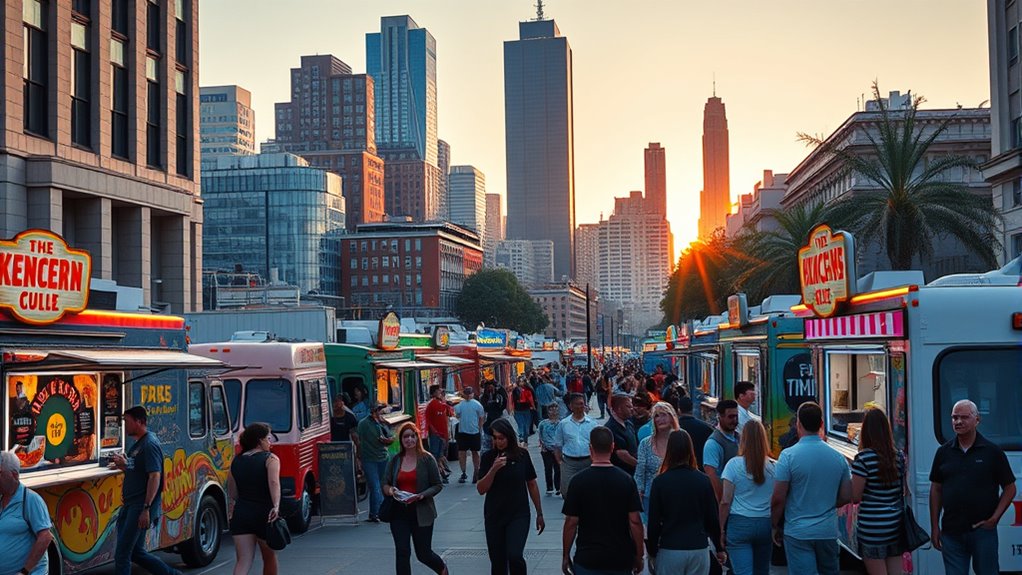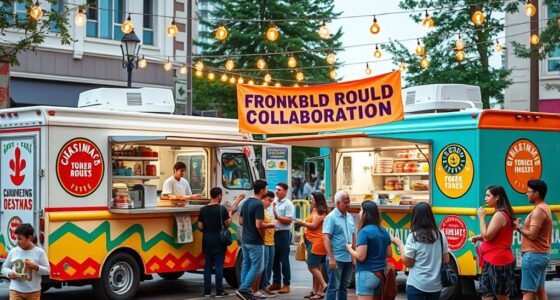To build cross-city networks as a food truck owner, start by connecting with other vendors through social media, industry events, and local meetups. Partner with nearby businesses and event organizers to share resources and co-host events. Use technology like booking apps and communication platforms to coordinate schedules and track performance. Focus on building genuine relationships, maintain open communication, and leverage shared marketing efforts. Staying involved in this community effort can open up new markets and income streams.
Key Takeaways
- Initiate contact through social media, forums, and industry meetups to connect with potential partners across cities.
- Develop shared operational plans covering scheduling, revenue sharing, and branding to ensure clear collaboration.
- Use technology like online booking apps and communication platforms to coordinate logistics and track performance.
- Build trust by maintaining open communication and fostering genuine relationships with regional partners.
- Leverage cross-city networks to diversify markets, expand brand visibility, and increase revenue streams.

Creating a cross-city network for food truck owners can substantially boost your business by expanding your reach and sharing resources. When you connect with other operators across different locations, you open doors to market diversification, which is essential for weathering local economic fluctuations or seasonal downturns. Instead of relying solely on your city’s customer base, you can tap into new markets, attracting a broader audience and increasing sales. This approach not only stabilizes your income but also enhances brand visibility on a regional level.
Building such a network requires strategic partnerships with other food truck owners and local businesses. These partnerships enable you to coordinate schedules, share equipment, and even co-host events, creating a more dynamic and appealing experience for customers. For instance, by teaming up with owners in neighboring cities, you can organize rotating locations or joint festivals that draw larger crowds. This collaborative effort reduces individual costs and risks while increasing your chances of attracting new customers. Additionally, forming strategic partnerships with local vendors or event organizers helps you tap into existing customer bases, providing a steady flow of patrons who are already interested in street food offerings.
Strategic partnerships with local vendors and event organizers boost customer flow and brand visibility across markets.
To establish this network effectively, you should start by reaching out to other food truck owners through social media groups, industry forums, or local meetups. Be proactive in sharing your goals and interests—emphasize the mutual benefits of collaboration, such as shared marketing efforts or joint promotions. It’s also wise to develop a clear plan for how your network will operate; setting expectations around scheduling, revenue sharing, and branding ensures smooth cooperation. As your network grows, consider creating a shared calendar or communication platform to coordinate locations and events efficiently. This organization helps prevent conflicts and maximizes each truck’s exposure across different markets.
Furthermore, leveraging technology can considerably streamline your cross-city operations. Mobile apps or online booking systems can help coordinate schedules and track performance across locations. These tools make it easier to analyze which areas generate the most interest, guiding future market diversification efforts. Regularly assessing your fetal development and overall growth during the process can provide insights into the success of your expansion strategy. Remember, the key to successful cross-city networking lies in building trust and fostering open communication. When you establish genuine relationships with your partners, you create a resilient network that benefits all involved. This collaborative approach not only enhances your business resilience but also positions you as a forward-thinking leader in the food truck industry. Ultimately, expanding your network across cities opens up new revenue streams, strengthens your brand, and keeps your business adaptable in a competitive marketplace.
Frequently Asked Questions
How Do I Find Reliable Partners Across Different Cities?
You can find reliable partners across different cities by focusing on partnership strategies that emphasize trust and shared goals. Network at industry events, join online food truck communities, and seek referrals from trusted contacts. Prioritize regional branding alignment to guarantee your partner’s image matches yours. Always conduct thorough background checks, discuss expectations upfront, and establish clear communication to build strong, dependable relationships that help expand your food truck network effectively.
What Permits Are Required for Multi-City Food Truck Operations?
Did you know that 65% of food truck violations involve licensing compliance? To operate across multiple cities, you need permits specific to each location, including health permits, food safety certifications, and business licenses. Make sure you understand each city’s regulations, as requirements can vary considerably. Failing to secure proper permits can lead to fines or shutdowns, so always verify local food safety standards and licensing compliance before hitting new markets.
How Can I Standardize My Menu for Various Locations?
You can standardize your menu by creating core items that remain consistent across all locations, ensuring menu consistency. Use uniform branding elements like fonts, colors, and packaging to promote branding uniformity. Train your staff thoroughly to maintain quality and presentation standards. Regularly review menu performance and gather customer feedback to refine offerings. This approach helps you deliver a cohesive experience, build brand recognition, and meet customer expectations everywhere you operate.
What Technology Tools Facilitate Cross-City Coordination?
You can use tools like Slack for real-time communication and digital mapping apps such as Mapbox to coordinate locations. For example, a food truck chain used Slack to streamline updates across cities and Mapbox to plan routes efficiently. These platforms help you stay connected, share updates quickly, and manage logistics seamlessly across multiple locations, making cross-city coordination more effective and less stressful.
How Do I Handle Inconsistent Local Regulations?
You handle inconsistent local regulations by staying updated on each area’s requirements for regulatory compliance and local licensing. You should establish relationships with local authorities and consult legal experts to guarantee you’re always compliant. Use digital tools to track regulation changes across cities, and adapt your operations accordingly. This proactive approach helps you avoid fines, streamline licensing processes, and maintain smooth cross-city food truck operations without legal setbacks.
Conclusion
Now that you see the value of building cross-city networks, don’t wait for the stars to align. By connecting with fellow food truck owners across cities, you’ll open doors to new opportunities, share valuable insights, and grow your business faster. Remember, many hands make light work, so teaming up can turn the tide in your favor. Get out there, forge those connections, and watch your food truck journey thrive beyond borders.









